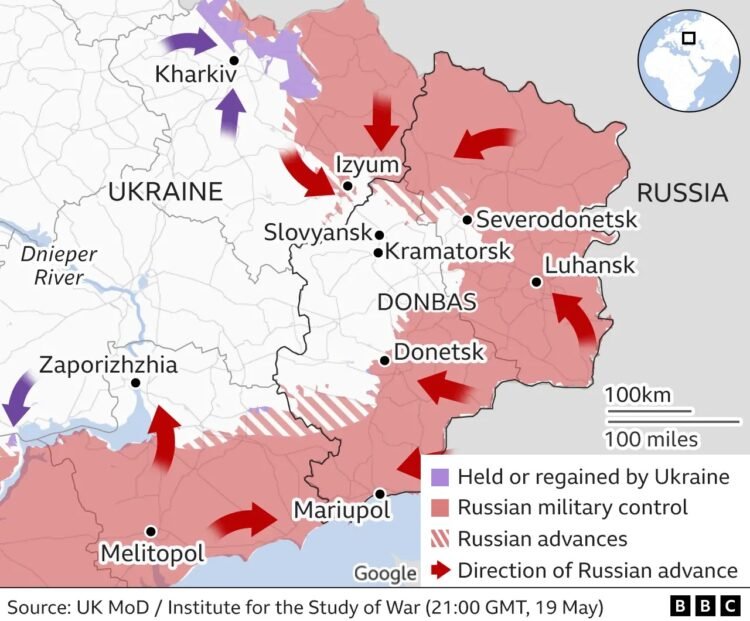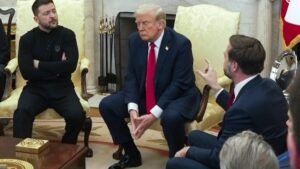WASHINGTON (AP) — In just 90 seconds, weeks of diplomatic maneuvering unraveled in dramatic fashion.
President Donald Trump’s heated confrontation with Ukrainian President Volodymyr Zelenskyy on Friday underscored the limits of efforts by U.S. allies to steer Trump’s approach to the war in Ukraine. Despite intense lobbying from European leaders, Trump made clear that his priority remains ending the war quickly—regardless of whether the terms favor Ukraine.
The fiery exchange, marked by finger-pointing, raised voices, and visible frustration, was one of the most intense public disputes between world leaders in the Oval Office in recent history. It cast fresh doubt on the future of U.S. support for Ukraine and Kyiv’s ability to sustain its fight against Russia without its strongest ally.
“You either make a deal, or we’re out,” Trump told Zelenskyy, signaling that U.S. support would no longer be open-ended.
Following the meeting, Zelenskyy took to social media, expressing gratitude to the American people, Trump, and Congress for their past support. “Our relationship with the American President is more than just two leaders; it’s a historic and solid bond between our peoples,” he wrote.
Zelenskyy later traveled to London for discussions with British Prime Minister Keir Starmer ahead of a European summit, where Ukraine’s next steps in the war and its relationship with the West would be key topics.
Allies’ Efforts to Influence Trump Fall Short
The dramatic breakdown in Washington followed a week of intense diplomatic efforts by European leaders to bridge the growing divide between Trump and Ukraine.
On Monday, French President Emmanuel Macron met with Trump to discuss the possibility of a European-led peacekeeping force to deter further Russian aggression. Macron urged Trump to take a more skeptical view of Russian President Vladimir Putin’s intentions.
By Thursday, British Prime Minister Keir Starmer made his own appeal, hoping to secure U.S. backing for a European-led security arrangement for Ukraine. Starmer extended an invitation from King Charles III for a state visit, a gesture meant to soften Trump’s stance.
At first, Trump struck a more conciliatory tone, calling U.S. support for Ukraine “a very worthy thing to do.” He even downplayed previous remarks in which he had referred to Zelenskyy as a “dictator.”
Yet, Trump dismissed concerns about Putin’s past broken promises, suggesting they had happened under previous administrations. Meanwhile, his aides were already planning talks with Russian officials, laying the groundwork for a potential Trump-Putin meeting in the coming weeks.
Ukraine’s Mineral Deal Stalls as Security Guarantees Remain Elusive
Trump’s primary focus remained on securing a financial stake in Ukraine’s valuable mineral resources—his way of recouping some of the tens of billions of dollars the U.S. had invested in Ukraine’s defense. Zelenskyy, in turn, wanted concrete security guarantees, not just vague assurances.
For weeks, U.S. officials made it clear that a meeting between Trump and Zelenskyy would only happen if Ukraine accepted the mineral deal. On Wednesday, Kyiv reluctantly agreed, paving the way for Friday’s meeting.
Initially, the conversation between Trump and Zelenskyy was polite, even cordial. Trump acknowledged Ukraine’s bravery and hinted at continued U.S. military aid—at least until a peace agreement could be secured.
But when Zelenskyy voiced concerns about trusting Putin, Vice President JD Vance chastised him for raising objections publicly.
That exchange instantly escalated the conversation. Zelenskyy defended his stance, while Trump and Vance accused him of being “ungrateful” and “disrespectful.”
Inside the Oval Office Showdown
Sen. Lindsey Graham, a longtime defense hawk and Trump ally, had warned Zelenskyy beforehand “not to take the bait” during his meeting with Trump. But Vance set the confrontation in motion, insisting that diplomacy was the only viable path forward.
“What kind of diplomacy are you talking about?” Zelenskyy shot back, listing instances where Russia had violated previous ceasefires.
“The kind that ends the destruction of your country,” Vance retorted, before criticizing Zelenskyy for airing disagreements with Trump in front of the media.
That’s when Trump delivered his most cutting remarks.
“You’re gambling with World War III,” he warned Zelenskyy. “And what you’re doing is very disrespectful to this country, which has backed you more than most people think we should have.”
As the conversation grew more heated, Trump positioned himself as a neutral figure between Ukraine and Russia.
“You see the hatred he has for Putin,” Trump said, motioning toward Zelenskyy. “That’s very tough for me to work with. It makes it hard to do business.”
By the end of the meeting, top Trump advisers asked Zelenskyy to leave the White House, abruptly canceling a planned lunch, joint press conference, and the signing of the economic agreement. Zelenskyy and his team pleaded for a “reset”—but the damage was done.
A Major Shift in U.S. Foreign Policy
This confrontation is just the latest example of Trump’s willingness to overhaul longstanding U.S. foreign policy positions.
In recent weeks, he has floated ideas such as permanently relocating Palestinians from Gaza and imposing steep tariffs on Mexico and Canada. His approach has sent shockwaves through diplomatic circles, leaving many U.S. allies uncertain about their standing with Washington.
Following Friday’s debacle, Trump doubled down, telling reporters he refused to “embolden” Zelenskyy if he wasn’t ready for peace. “You can’t embolden someone who doesn’t have the cards,” Trump said.
Zelenskyy, meanwhile, appeared on Fox News later that evening, acknowledging the confrontation was “not good for both sides.”
Still, he pushed back against Trump’s optimism about a quick peace deal with Russia. “Putin will come back tomorrow,” Zelenskyy warned. “We need real security guarantees.”
As he closed his interview, Zelenskyy’s tone softened slightly. After refusing multiple opportunities to apologize to Trump, he ended with a quiet acknowledgment of the shifting political winds in Washington.
“Sorry for this,” he said.

 English
English




























































